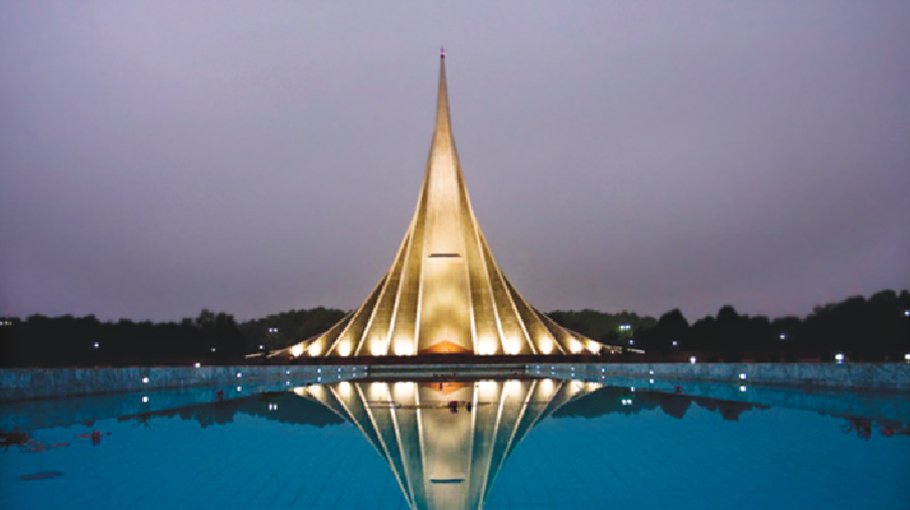On this day in 1971

The ultimate victory of the nation was achieved through a nine-month bloody War of Liberation under the uncompromising leadership and guidance of the Father of the Nation Bangabandhu Sheikh Mujibur Rahman.
On this day on December 2 in 1971, sensing imminent defeat, Pakistani forces and their local collaborators— Shanti committee (peace committee), Razakars, Al-Badr and Al-Shams had started carrying out massacre killing Bengali people across the country since November last week.
On the other hand, Muktibahini also killed and arrested many Pakistani occupation forces and took control of many occupied places on December 2.
After 49 years, the people are now determined to let their country turn into ‘Golden Bangla’ as dreamt of by the Father of the Nation Sheikh Mujibur Rahman through their struggles.
According to the Liberation War Museum, on this day on December o2, Muktibahini attacked a Pakistan army camp at Ghorashal in Narshingdi and killed 27 military men. They seized a large number of arms and ammunition.
Muktibahini occupied Azampur Railway Station in Akhaura upazila of Brahmanbaria.
The Pakistan army, however, gathered strength and recaptured the station.
Later, the liberation force organised themselves again and drove away the Pakistanis with a three-pronged attack strategy.
Muktibahini guerrillas captured Fatikchhari, Raujan and Dakshin Anwara in Chittagong and fought to death to liberate Patiya.
Muktibahini killed five Pakistan military men at Bijoypur area of Birisiri in Netrakona during an ambush and arrested 21 armed Razakars.
Hundreds of thousands of Bangladeshis can return home to live in peace if the Pakistan army leaves Bangladesh, said Indian Prime Minister Indira Gandhi during a meeting of the Congress in New Delhi.
Pakistan military commander Mosleh Uddin, along with a group of Razakars, went to a village named Kathali of Bhaluka upazila in Mymensingh to loot, vandalise and set fire to the houses.
Meanwhile, Muktibahini, led by section commanders Gias Uddin and Abdul Wahed, attacked and kill three militia men and seven Razakars.
Leaders of People’s Party and Jamaat-e-Islami in Bangladesh urged President Yahya Khan to attack India on the West Pakistan frontier to preserve the integrity of two parts of Pakistan.
Behind the victory there was a long history of deprivation and bloodshed and supreme sacrifice of our people.
The seeds of independence that were sown in the language movement in 1952 came into being through the declaration of independence by Bangabandhu on March 26 in 1971 after overcoming various ups and downs and staging long movement and agitation against Pakistani rulers.
Bengali nation every year pays its deep homage to the valiant freedom fighters, who made supreme sacrifice in the war of liberation for the cause of country’s independence.
The people of Bangladesh also extend their deep gratitude to the organisers and supporters, foreign friends and the people from all strata who directly and indirectly made meaningful contributions to the war of liberation.
The nation recalls their contributions with utmost gratitude.
The aims of the country’s independence were to attain political sovereignty as well as economic emancipation. Keeping that in mind, Bangabandhu started his journey for achieving economic self-sufficiency by rebuilding economy and infrastructure of the war-ravaged country.
But the progress of country’s democracy and development came to a halt after the assassination of Father of the Nation and his near and dear ones on August 15, 1975.”
The emergence of autocracy and undemocratic government came into being.
After passing a long time, the democratic government, bearing the flag of war of liberation, has now been established.
With a view to materialising the unfinished tasks of Bangabandhu, Prime Minister Sheikh Hasina has taken Vision 2021, Vision 2041 and hundred years long ‘Bangladesh Delta Plan 2100.
The objectives of these plans are to attain the targets of the UN Sustainable Development Goals (SDGs) by 2030 and to turn Bangladesh into a developed and prosperous country by 2041 respectively.
Country’s people are now getting benefits of the development programmes.
With successive economic growth, Bangladesh is marching forward in every socio-economic indicator including education, health, women empowerment, per capita income etc.
Bangladesh has got recognition of the status of low-middle-income country and graduated from least developed country (LDC) to a developing country.
The Padma Bridge, which is being constructed by our own resources, is now a reality, while mega projects like Metro Rail, Elevated Expressway are being implemented.
Bangladesh is now a proud member of the elite satellite club through launching of Bangabandhu-1 Satellite into the space.
With the pace of the continuing development, People are confident that Bangladesh will turn into a prosperous country by 2041.
Country’s people will have to join the development process with positive mindset along with modern and scientific attitude making the desired development sustainable and speedy.
The country’s foreign policy is being exercised in accordance with the principle “Friendship to all, malice towards none” as adopted by Father of the Nation.
Bangladesh has set a unique example of humanity in international arena by providing shelter to millions of forcefully displaced and tortured Rohingyas fled from Myanmar.
Bangladesh believes in a peaceful solution to the problem.
The birth centenary celebration of Bangabandhu Sheikh Mujibur Rahman and the Golden Jubilee celebration of the country’s independence, the two landmark and historic events of our history, is being observed throughout the country and outside Bangladesh in a befitting manner in 2020 and 2021 respectively amid Covid-19 pandemic.



